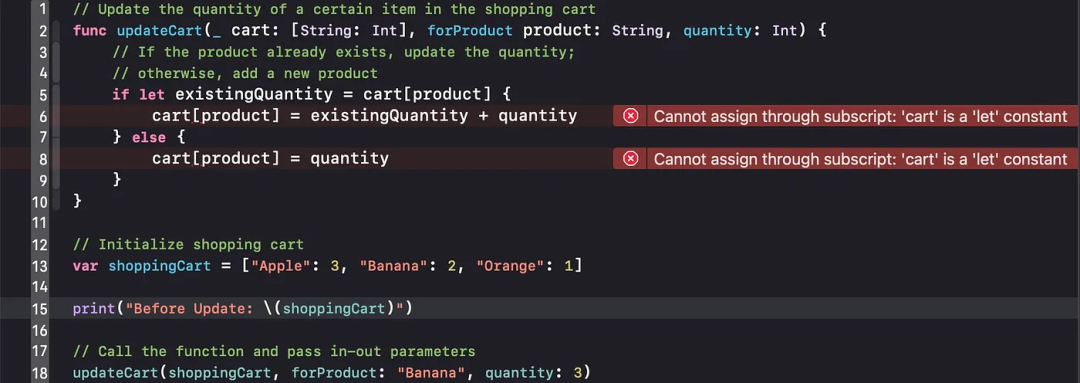
本文我们将介绍在 Swift 中如何定义函数、定义可选参数、可变参数和函数类型。
接下来,我们启动 Xcode,然后选择 "File" > "New" > "Playground"。创建一个新的 Playground 并命名为 "Functions"。
在 Swift 中,函数是一种用于执行特定任务的独立代码块。函数使得代码模块化,可重用,并且更易于理解。
定义和调用函数
在 Swift 中,定义函数使用 func 关键字,可以指定参数和返回类型。而在 TypeScript 中,定义函数是使用 function 关键字。
Swift Code
func greet(name: String) -> String {
return "Hello, \(name)!"
}
let greetingMessage = greet(name: "Semlinker")
print(greetingMessage)
// Output: Hello, Semlinker!TypeScript Code
function greet(name: string): string {
return `Hello, ${name}!`;
}
const greetingMessage: string = greet("Semlinker");
console.log(greetingMessage);
// Output: "Hello, Semlinker!"定义包含多个参数的函数
在定义函数时,可以为函数添加多个参数。
Swift Code
func calculateRectangleArea(length: Double, width: Double) -> Double {
return length * width
}
let area = calculateRectangleArea(length: 5.0, width: 3.0)
print("The area of the rectangle is \(area)")
// Output: The area of the rectangle is 15.0TypeScript Code
function calculateRectangleArea(length: number, width: number): number {
return length * width;
}
const area: number = calculateRectangleArea(5.0, 3.0);
console.log(`The area of the rectangle is ${area}`);
// Output: "The area of the rectangle is 15"为函数的参数设置默认值
在 Swift 中,可以为函数参数设置默认值。当用户调用函数时,如果未传递参数值,则会使用该参数的默认值。
Swift Code
func greet(name: String, greeting: String = "Hello") -> String {
return "\(greeting), \(name)!"
}
let customGreeting = greet(name: "Semlinker", greeting: "Greetings")
let defaultGreeting = greet(name: "Semlinker")
print(customGreeting)
print(defaultGreeting)
/**
Output:
Greetings, Semlinker!
Hello, Semlinker!
*/TypeScript Code
function greet(name: string, greeting: string = "Hello"): string {
return `${greeting}, ${name}!`;
}
const customGreeting: string = greet("Semlinker", "Greetings");
const defaultGreeting: string = greet("Semlinker");
console.log(customGreeting);
console.log(defaultGreeting);
/**
Output:
"Greetings, Semlinker!"
"Hello, Semlinker!"
*/定义可选参数
Swift Code
func greet(name: String, greeting: String? = nil) -> String {
if let customGreeting = greeting {
return "\(customGreeting), \(name)!"
} else {
return "Hello, \(name)!"
}
}
let customGreeting = greet(name: "Semlinker", greeting: "Greetings")
let defaultGreeting = greet(name: "Semlinker")
print(customGreeting)
print(defaultGreeting)
/**
Output:
Greetings, Semlinker!
Hello, Semlinker!
*/如果你对 if let 语法不熟悉的话,可以阅读这篇文章。
TypeScript Code
function greet(name: string, greeting?: string): string {
if (greeting) {
return `${greeting}, ${name}!`;
} else {
return `Hello, ${name}!`;
}
}
const customGreeting: string = greet("Semlinker", "Greetings");
const defaultGreeting: string = greet("Semlinker");
console.log(customGreeting);
console.log(defaultGreeting);
/**
Output:
"Greetings, Semlinker!"
"Hello, Semlinker!"
*/定义可变参数
可变参数允许函数接受不定数量的参数。在 Swift 中,通过在参数类型后面添加省略号 ... 来声明可变参数。
Swift Code
func calculateSum(_ numbers: Double...) -> Double {
return numbers.reduce(0, +)
}
let sum = calculateSum(4, 5, 6)
print("Sum: \(sum)")
// Output: Sum: 15.0函数 calculateSum 接受一个可变参数 numbers,这意味着它可以接受不定数量的 Double 参数。而下划线 _ 表示我们在调用函数时可以省略对这个参数的外部命名,使调用更加简洁。
Swift Code
let sum1 = calculateSum(4, 5, 6)在这个调用中,我们直接将数字传递给 calculateSum,而不需要指定参数名。如果没有使用下划线 _,调用将会是这样的:
Swift Code
func calculateSum(numbers: Double...) -> Double {
return numbers.reduce(0, +)
}
let sum = calculateSum(numbers: 4, 5, 6)TypeScript Code
function calculateSum(...numbers: number[]): number {
return numbers.reduce((sum, num) => sum + num, 0);
}
const sum = calculateSum(4, 5, 6);
console.log(`Sum: ${sum}`);
// Output: "Sum: 15"In-out 参数
在 Swift 中,函数参数可以被声明为 in-out 参数,这意味着这些参数可以被函数改变,并且这些改变会在函数调用结束后保留。这种特性在需要在函数内修改参数值的情况下非常有用。
Swift Code
// Update the quantity of a certain item in the shopping cart
func updateCart(_ cart: inout [String: Int], forProduct product: String, quantity: Int) {
// If the product already exists, update the quantity;
// otherwise, add a new product
if let existingQuantity = cart[product] {
cart[product] = existingQuantity + quantity
} else {
cart[product] = quantity
}
}
// Initialize shopping cart
var shoppingCart = ["Apple": 3, "Banana": 2, "Orange": 1]
print("Before Update: \(shoppingCart)")
// Call the function and pass in-out parameters
updateCart(&shoppingCart, forProduct: "Banana", quantity: 3)
print("After Update: \(shoppingCart)")
/**
Output:
Before Update: ["Apple": 3, "Banana": 2, "Orange": 1]
After Update: ["Apple": 3, "Banana": 5, "Orange": 1]
*/如果将 cart 参数中的 inout 关键字去掉,Swift 编译器会提示以下错误信息:

函数返回多个值
Swift 中的函数可以返回多个值,实际上是返回一个包含多个值的元组。
Swift Code
func getPersonInfo() -> (name: String, age: Int) {
return ("Semlinker", 30)
}
let personInfo = getPersonInfo()
print("Name: \(personInfo.name), Age: \(personInfo.age)")
// Output: Name: Semlinker, Age: 30TypeScript Code
function getPersonInfo(): [string, number] {
return ["Semlinker", 30];
}
const personInfo: [string, number] = getPersonInfo();
console.log(`Name: ${personInfo[0]}, Age: ${personInfo[1]}`);
// Output: "Name: Semlinker, Age: 30"函数类型
在 Swift 中,函数类型可以用来声明变量、常量、作为函数参数和函数返回值的类型。
声明函数类型
在 Swift 中,声明函数类型时需要指定参数类型和返回类型。
Swift Code
func add(_ a: Int, _ b: Int) -> Int {
return a + b
}
// 声明一个函数类型的变量
var mathFunction: (Int, Int) -> Int
// 将 add 函数赋值给变量
mathFunction = add
// 使用函数类型的变量调用函数
let result = mathFunction(2, 3)
print("Result: \(result)")
// Output: Result: 5TypeScript Code
function add(a: number, b: number): number {
return a + b;
}
// 声明一个函数类型的变量
let mathFunction: (a: number, b: number) => number;
// 将 add 函数赋值给变量
mathFunction = add;
// 使用函数类型的变量调用函数
const result: number = mathFunction(2, 3);
console.log(`Result: ${result}`);
// Output: "Result: 5"函数类型作为参数的类型
Swift Code
func add(_ a: Int, _ b: Int) -> Int {
return a + b
}
func executeMathOperation(_ a: Int, _ b: Int, _ operation: (Int, Int) -> Int) -> Int {
return operation(a, b)
}
// 调用以上函数并将 add 函数作为参数传递
let result = executeMathOperation(2, 3, add)
print("Result: \(result)")
// Output: Result: 5TypeScript Code
function add(a: number, b: number): number {
return a + b;
}
function executeMathOperation(a: number, b: number, operation: (a: number, b: number) => number): number {
return operation(a, b);
}
// 调用以上函数并将 add 函数作为参数传递
const result = executeMathOperation(2, 3, add);
console.log(`Result: ${result}`);
// Output: "Result: 5"函数类型作为返回值的类型
Swift Code
func add(_ a: Int, _ b: Int) -> Int {
return a + b
}
// 定义一个返回加法函数的函数
func getAdditionFunction() -> (Int, Int) -> Int {
return add
}
// 获取加法函数并调用
let additionFunction = getAdditionFunction()
let result = additionFunction(2, 3)
print("Result: \(result)")
// Output: Result: 5TypeScript Code
function add(a: number, b: number): number {
return a + b;
}
// 定义一个返回加法函数的函数
function getAdditionFunction(): (a: number, b: number) => number {
return add;
}
// 获取加法函数并调用
const additionFunction: (a: number, b: number) => number = getAdditionFunction();
const result: number = additionFunction(2, 3);
console.log(`Result: ${result}`);
// Output: "Result: 5"本文我们介绍了在 Swift 中如何定义函数、定义可选参数、可变参数和函数类型等相关的内容。通过与 TypeScript 语法的对比,希望能帮助您更好地理解 Swift 的相关特性。

































